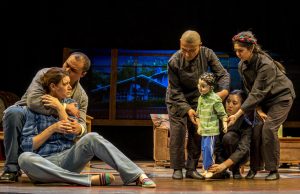Rep’s ‘Oldest Boy’ Has the Horses, but Sarah Ruhl Won’t Saddle Up
“For everyone to whom much has been given,” reads Luke 12:48, “much is demanded.” That means that Mother, central character in San Diego Repertory Theatre’s The Oldest Boy, has some serious requirements to fill. Brains, beauty, wit, a steadfast husband, a thriving household, a precocious 3-year-old son, a seeker’s exhaustive spirit: Mom pretty much has it all, and she’s about to discover the price for her bounty. Tenzin, the little boy, is believed to be a tulku, or the reincarnation of a Buddhist master, and a red-robed lama and monk have shown up at Mother’s door requesting he be taken to India to assume a life of religious teaching.
Now, there’s some sticker shock.
While Sarah Ruhl’s play has a pretty strong main character in Mother, the bigger story is one of maternal love and cross-cultural sacrifice. In this case, it’s embroidered with accouterments and music from the Eastern religious experience, fueled by Mother’s characterization (indeed, she’s a lapsed Catholic who intends to convert to Buddhism, and she’s married to a Tibetan).

From left, Mother has too much to handle all at once as Father (Napleon Tavale), The Oldest Boy (Tsering Dorjee Bawa) and puppeteers Joyce Lai and Jarissa Saracino make their case for Tenzin (third from right). Photo by Daren Scott
Among her many attributes, Mother endorses attachment parenting modalities, which state that intimacy is the key to raising cool kids (she has one of those baby monitors in her living room to keep an eye on Tenzin when he’s out of sight; she’s likely a de facto proponent of breastfeeding, and she probably steals lots of time to nap with the boy). Such principles must naturally conflict with the tenets her visitors embody, as Buddhism fiercely rejects earthly attachments of any kind.
… [W]e never get a true sense of what must have been an epic back-and-forth on the parents’ plans for the boy.
You’d think that this Sam Woodhouse-directed entry would at the very least introduce a hefty religious argument on the two parenting styles in deference to Mother – but this is lost in favor of Ruhl’s hasty construction. Not only do we already know Tenzin is the tulku (check out his cultured, authoritative voice); Ruhl whisks him off to an Indian monastery with very little on Mother’s presumed instinct to protect him. Meanwhile, the role of Father is so desperately underwritten that we never get a true sense of what must have been an epic back-and-forth on the parents’ plans for the boy.
From there, the play bursts into lavish Eastern-tinged song and dance – and while it’s absolutely lovely out of context, it loses its relevance amid Ruhl’s lack of exposition regarding Tenzin’s immediate future. It all makes for an odd kind of play, one that assumes we care about the action before it’s fully committed to paper.
Don’t blame San Diego theater veteran Amanda Sitton, though. In some respects, Mother leans toward Stepford wifery amid her attachment parenting role and the often trendy real-life interest in Eastern thought – but Sitton’s character is earnest and bright, with a mind as sincere as it is inquisitive. Albert Park’s Lama and Christopher Aguilar’s Monk are equally persuasive amid their lightnesses of being and their silly senses of humor. The father (Napoleon Tavale) and the Oldest Boy (Tsering Dorjee Bawa, also the show’s choreography and cultural consultant) don’t impress quite as thoroughly, chiefly due to Ruhl’s threadbare writing.
… [T]he play runs a little too presumptuous amid the topic’s import.
As dancers/puppeteers, Joyce Lai and Janissa Saracino sport very interesting faces, rife with the gentility their characters feel toward the giant puppet that depicts Tenzin. The puppet helps feed the exotic quality of the show’s tech, but Tenzin’s face and body are oversculpted, to the point of unsettling.
Lighting designer Jennifer Setlow gets the tech honors, ensuring that Sean Fanning’s set pieces and Jennifer Brawn Gittings’ costumes are uniformly and complementarily lit. Kevin Anthenill’s sound is as formidable as the sights at hand.
But for all the show’s pomp and circumstance, the play runs a little too presumptuous amid the topic’s import. Attachment parenting concepts make for some interesting subtext here; sadly, Ruhl never really tells us why.
This review is based on the matinee performance of Nov. 21. The Oldest Boy runs through Dec. 6 at the Lyceum Stage, 79 Horton Plaza, downtown. $33-$66. 619-544-1000, sdrep.org.

Martin Jones Westlin, principal at editorial consultancy Words Are Not Enough and La Jolla Village News editor emeritus, has been a theater critic and editor/writer for 25 of his 47 years…
More…


